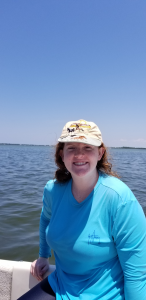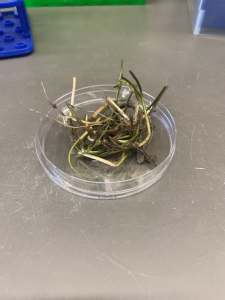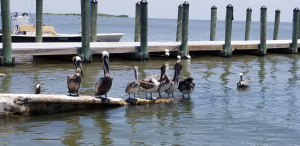Written by 2021 UF/IFAS NCBS Summer Intern, Emilee Stump
 My name is Emilee Stump and this summer I interned in the Meyer Microbial Ecology Lab. Over the course of this internship, I researched the bacterial symbionts associated with marine bivalves and seagrass roots. This project focused on collecting samples from Cedar Key and investigating the roles that these potentially beneficial bacteria have in the seagrass and lucinid clam relationship.
My name is Emilee Stump and this summer I interned in the Meyer Microbial Ecology Lab. Over the course of this internship, I researched the bacterial symbionts associated with marine bivalves and seagrass roots. This project focused on collecting samples from Cedar Key and investigating the roles that these potentially beneficial bacteria have in the seagrass and lucinid clam relationship.
This internship allowed me to gain several valuable skills and experience doing fieldwork. Some of these research skills included conducting DNA extractions and PCR amplification, learning microscopy skills such as fluorescence in situ hybridization to visualize bacterial symbionts, and collecting/preserving seagrass roots in different environments.

This research was primarily conducted in the lab and included a field day for seagrass root collection at Cedar Key to retrieve our study samples. The primary goals of this project were to collect 3 species of seagrass roots from Cedar Key for isolating thiodiazotrophic bacteria and to analyze the composition and prevalence of nitrogen fixating bacteria in seagrass roots.
At Cedar Key
We were able to collect all three species of seagrasses that we were looking for: turtle grass, manatee grass, and shoal grass (common names). These seagrasses are particularly important for research/monitoring because they are an important resource for much of Florida’s wildlife. This fieldwork was an amazing experience since I got to snorkel at both Seahorse Key and Snake Key to collect seagrass, water, and sediment samples. We saw a wide range of Cedar Key’s ecology and wildlife including some starfish, crabs, several bird and fish species, and a manatee visiting the seagrass beds! I worked with Dr. Julie Meyer on this research, and she introduced me to several of the skills we needed for a successful field day.

At the Lab
I preserved these seagrass samples and made the necessary sulfide oxygen gradient tubes to further study these beneficial bacteria. I gained a lot of hands-on experience from this internship and learned a great deal about the biochemistry behind several influential microbes. I am very grateful to Dr. Julie Meyer and everyone in the Meyer Microbial Ecology Lab for this research experience. This internship allowed me to continue my career interests in research and enhance my appreciation for seagrasses because of the vital role they play in marine ecosystems.

 0
0
